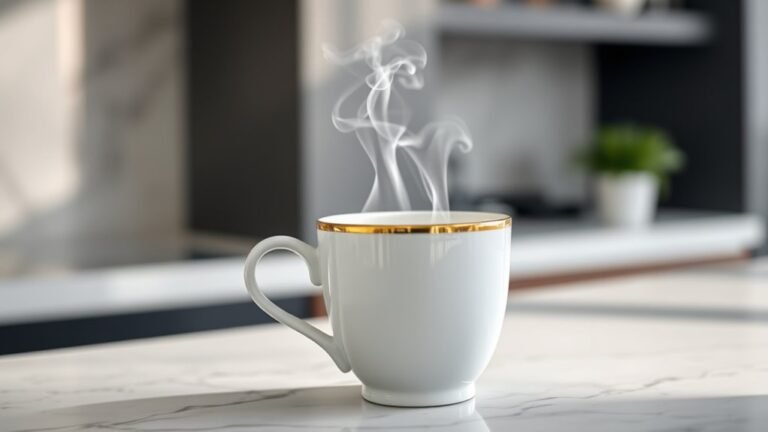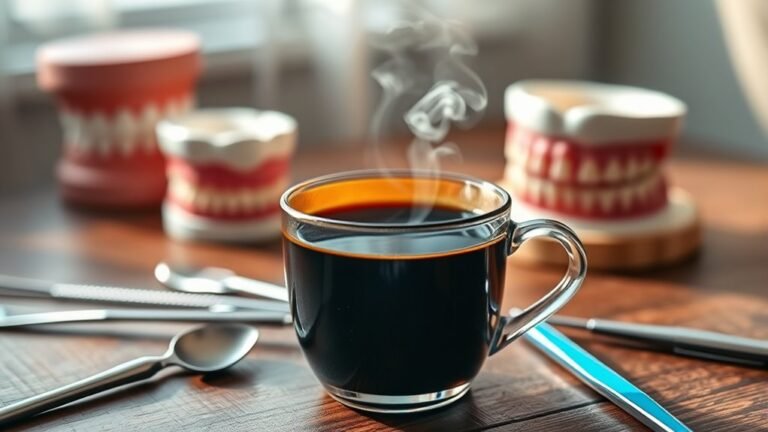Coffee and Anxiety: Can Coffee Make You Anxious?
Yes, coffee can make you anxious because caffeine stimulates your nervous system by blocking calming adenosine receptors and releasing stress hormones like cortisol. Your sensitivity varies due to genetics and tolerance—some feel jittery and restless after just one cup, while others hardly notice. Drinking too much or too late can increase anxiety and disrupt sleep. Managing intake and exploring alternatives can help, and understanding these effects offers ways to enjoy coffee without stress creeping in.
How Caffeine Affects the Nervous System

Although caffeine is widely enjoyed for its stimulating effects, it’s important to understand how it interacts with your nervous system to influence anxiety levels. When you consume caffeine, it blocks adenosine receptors, preventing the calming neurotransmitter from signaling your brain to relax. This leads to increased release of stimulants like dopamine and norepinephrine, heightening alertness but potentially triggering anxiety. Your nervous system responds differently depending on your caffeine tolerance—regular consumption can blunt these effects, yet sudden intake or sensitivity may provoke nervousness. Recognizing this balance empowers you to manage your coffee habits without feeling controlled by anxiety. By understanding how caffeine modulates your nervous system, you reclaim freedom over your mental state, making informed choices that respect both your body’s limits and your desire for autonomy.
Symptoms of Anxiety Triggered by Coffee
When you consume coffee, you might notice physical symptoms like a racing heart, jitters, or increased sweating, which are common anxiety indicators. Psychologically, caffeine can heighten feelings of nervousness, restlessness, and difficulty concentrating. Understanding these effects can help you recognize how your body and mind respond to coffee’s stimulant properties.
Physical Anxiety Symptoms
Since caffeine stimulates your central nervous system, it can trigger physical symptoms commonly associated with anxiety, such as increased heart rate, sweating, and muscle tension. You might notice:
- Increased heart rate — your pulse quickens, making you feel on edge.
- Physical tension — muscles tighten, especially around your shoulders and neck.
- Sweating — even without physical exertion, your body temperature rises.
- Restlessness — difficulty sitting still or relaxing.
These symptoms can feel overwhelming, especially if you’re sensitive to caffeine. Understanding that these are common physical responses can help you regain control and choose whether coffee is worth the trade-off. Remember, your freedom to feel calm and in control matters more than a temporary energy boost. Adjusting your intake or timing might ease these uncomfortable sensations without sacrificing your daily routine.
Psychological Effects of Caffeine
Because caffeine affects your brain’s chemistry, it can provoke psychological symptoms that mirror or worsen anxiety. You might experience heightened restlessness, irritability, or racing thoughts after consuming coffee, which can feel overwhelming. This happens because caffeine stimulates the central nervous system, increasing alertness but sometimes triggering nervousness or panic in sensitive individuals. Over time, you could develop psychological dependence, feeling unable to function without your daily dose. When you try to cut back, caffeine withdrawal can lead to mood swings, difficulty concentrating, and increased anxiety, creating a challenging cycle. Understanding these effects is essential if you crave freedom from anxiety’s grip. Being mindful of your caffeine intake and its psychological impact empowers you to make choices that support your mental well-being without sacrificing alertness.
The Science Behind Coffee-Induced Anxiety
When you drink coffee, caffeine blocks a brain chemical called adenosine, which normally promotes relaxation, leading to increased alertness but also heightened nervousness. This blockage triggers the release of stress hormones like cortisol and adrenaline, which can amplify feelings of anxiety. Understanding these mechanisms helps explain why coffee affects your mood and why some people feel more anxious after a cup.
Caffeine’s Impact on Brain
Although coffee is a beloved morning ritual for many, its caffeine content can considerably affect your brain chemistry, leading to feelings of anxiety. When you consume caffeine, it interacts with your brain receptors, primarily blocking adenosine, a neurotransmitter that promotes relaxation. This disruption can lead to increased alertness but also heightened nervousness. Your body’s caffeine metabolism rate influences how long these effects last, varying widely among individuals.
Here’s what happens in your brain:
- Caffeine blocks adenosine receptors, reducing calm signals.
- This causes a surge in stimulating neurotransmitters like dopamine.
- Your metabolism determines how quickly caffeine is cleared.
- Prolonged receptor stimulation can sensitize anxiety pathways.
Understanding this helps you take control of your coffee intake without sacrificing your freedom or well-being.
Anxiety Mechanisms Triggered
The way caffeine alters your brain chemistry sets the stage for specific anxiety mechanisms to kick in. When you consume coffee, caffeine blocks adenosine receptors, increasing neural activity and releasing stress hormones like cortisol. This heightened state can activate anxiety triggers, especially if your caffeine metabolism is slower, causing prolonged stimulant effects. You might notice your heart racing or feeling jittery—classic signs of your body responding to this chemical surge. Furthermore, caffeine can disrupt your balance of neurotransmitters such as dopamine and serotonin, which regulate mood and anxiety. Understanding these mechanisms empowers you to recognize how coffee might contribute to anxious feelings. By tuning into how your body processes caffeine, you gain freedom to adjust your intake, reducing unwanted anxiety without sacrificing your love for coffee.
Individual Sensitivity to Caffeine
Since everyone processes caffeine differently, your sensitivity to it can greatly influence how coffee affects your anxiety levels. Your unique caffeine tolerance, shaped by genetic factors, determines how strongly caffeine stimulates your nervous system. If you’re highly sensitive, even a small amount might trigger jitteriness or heightened anxiety. Understanding your sensitivity can empower you to enjoy coffee without unnecessary stress. Consider these points:
Individual caffeine sensitivity shapes how coffee impacts your anxiety—know your tolerance to enjoy it worry-free.
- Genetic variations affect caffeine metabolism speed.
- High caffeine tolerance often means fewer anxiety symptoms.
- Low tolerance can lead to increased heart rate and nervousness.
- Sensitivity may fluctuate due to age, medications, or health conditions.
How Much Coffee Is Too Much?
How much coffee is too much really depends on your body’s response and overall health. While general guidelines suggest keeping caffeine intake below 400 milligrams per day—about four cups of brewed coffee—your personal tolerance might be lower. Exceeding these daily limits can increase anxiety symptoms, especially if you’re sensitive to caffeine or prone to stress. It’s important to observe how your body reacts after each cup. If you notice jitters, restlessness, or racing thoughts, it might be time to cut back. Remember, the goal isn’t to eliminate coffee altogether, but to enjoy it without compromising your mental well-being. Being aware and adjusting your caffeine intake empowers you to maintain control and preserve your freedom to enjoy coffee responsibly.
Alternatives to Coffee for Reducing Anxiety

Although coffee can boost alertness, it often exacerbates anxiety symptoms for many people. If you’re seeking freedom from jittery feelings, consider these alternatives to coffee for reducing anxiety. First, herbal teas like chamomile or lavender offer calming effects without caffeine’s spike. Second, mindfulness practices such as meditation help regulate stress responses and promote mental clarity. Third, engaging in regular physical activity releases endorphins, naturally easing anxiety. Fourth, maintaining a balanced diet with magnesium-rich foods can support nervous system health. By replacing coffee with these options, you not only reduce anxiety triggers but also gain tools to manage stress sustainably. Embracing such alternatives empowers you to find calm without sacrificing energy or focus, fostering a healthier, freer lifestyle.
Tips for Managing Anxiety While Enjoying Coffee
Finding alternatives to coffee can help reduce anxiety, but for many, giving up their favorite brew isn’t realistic or desired. Instead, you can practice mindful consumption and incorporate calming rituals to enjoy coffee without triggering anxiety. Here’s a simple guide:
| Tip | Action | Benefit |
|---|---|---|
| Mindful Consumption | Limit to 1-2 cups/day | Prevents caffeine overload |
| Time Your Intake | Avoid late afternoon coffee | Reduces sleep disturbances |
| Calming Rituals | Pair coffee with deep breaths | Lowers stress response |
| Hydration | Drink water alongside coffee | Balances caffeine effects |
When to Seek Professional Help for Anxiety
When should you consider reaching out to a mental health professional about anxiety related to coffee or other triggers? If your symptoms persist, intensify, or disrupt daily life, it’s time to seek help. Recognizing when professional guidance is needed empowers you to regain control and freedom from anxiety. Consider reaching out if:
Seek professional help if anxiety from coffee or triggers persists, worsens, or disrupts your daily life.
- Anxiety episodes increase in frequency or severity despite lifestyle changes.
- You experience panic attacks or physical symptoms like heart palpitations after coffee.
- Your ability to function socially or professionally is impaired.
- Self-help strategies aren’t enough, and you want to explore therapy options or support groups.
A mental health professional can tailor evidence-based treatments, helping you manage anxiety effectively and reclaim your peace.
Frequently Asked Questions
Does Decaf Coffee Affect Anxiety Levels?
If you’re wondering about decaf coffee’s impact on anxiety, it generally has fewer effects due to its low caffeine content, which suits those with caffeine sensitivity. Decaf benefits include allowing you to enjoy coffee’s flavor without the jittery side effects. While it’s not entirely caffeine-free, the reduced amount usually means less chance of triggering anxiety, helping you maintain freedom from nervousness while still savoring your cup.
Can Coffee Withdrawal Cause Anxiety Symptoms?
Yes, when you stop consuming caffeine suddenly, especially if you have high caffeine sensitivity, you might experience withdrawal symptoms like anxiety. Your body gets used to caffeine’s stimulating effects, so removing it can cause irritability, nervousness, or increased heart rate. Understanding this helps you regain control and freedom over your well-being. Gradually reducing intake can minimize these symptoms, allowing you to manage your anxiety more effectively without feeling trapped by caffeine dependence.
Is Coffee More Anxiety-Inducing Than Other Caffeinated Drinks?
Isn’t it frustrating when a single sip can set your nerves on edge? Coffee isn’t inherently more anxiety-inducing than other caffeinated drinks, but your caffeine sensitivity plays a huge role. Energy drinks or sodas might have added sugars or stimulants that affect you differently. Understanding drink comparisons helps you choose what suits your body best, giving you the freedom to enjoy caffeine without unnecessary jitters or anxiety.
How Does Coffee Interact With Anti-Anxiety Medications?
When you drink coffee while on anti-anxiety meds, it can affect how your body metabolizes both substances. Coffee metabolism speeds up, potentially reducing your medication’s effectiveness. This interaction might make managing anxiety trickier, which isn’t what you want. It’s wise to consult your doctor about your coffee intake, so you stay in control without compromising your treatment. Balancing caffeine and meds thoughtfully helps you maintain both freedom and wellness.
Can Drinking Coffee in the Morning Reduce Anxiety Later?
If your morning routine includes coffee, you might find it boosts mental clarity, helping you feel more focused and calm throughout the day. However, caffeine affects everyone differently—while it can enhance alertness, it might also trigger anxiety in some. It’s important to listen to your body and adjust accordingly. Balancing your caffeine intake with mindful practices can support your freedom to manage anxiety effectively and maintain a clear, steady mind.






